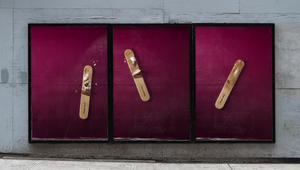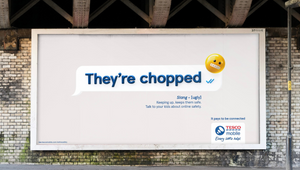
5 Minutes with… Helen Rhodes

Following a two year stint at BBC’s in-house creative agency, Helen Rhodes joined BBH London as executive creative director in mid 2021.
Her time at the British public service broadcaster had been a unique one. Helen oversaw all of the broadcaster’s campaigns, steering BBC Creative through the pandemic, communicating the value of the BBC’s public service and reaching new audiences during the nation’s time of need.
Prior to that, Helen spent six years as a Brit abroad at Wieden+Kennedy Portland, where she was instrumental in making KFC culturally relevant again.
In her role at BBH, Helen is driving the creative work forward, making work that engages with societal moments and modern culture.
Now she’s had time to bed back in at the agency where her career began, LBB’s Alex Reeves caught up with Helen.
LBB> What was life like growing up? And how did it set you on a path towards a creative career?
Helen> My parents weren’t beat poets or avant-garde painters, but creativity did manifest itself in various ways as I was growing up.
My mum was a drama teacher and whenever she took her students to the theatre, me and my sister tagged along. It was brilliant being exposed to plays at such a young age. I loved everything about it, the performances, the set design, the costumes.
My dad sold timber and he had an artistic side too. He would doodle on everything. If there was a face in a magazine or newspaper he would draw various hairstyles and moustaches on them to change their appearance. I grew up thinking a lot of famous people looked like Hitler.
This fascination with drawing, not Hitler, rubbed off on me and I would obsessively sketch whatever I was into. Garfield and Smurfs featured heavily in my repertoire in the early years.
LBB> How did you get into advertising? Was it a purposeful decision or more of an accident?
Helen> I was doing some temp work as a secretary and in between making cups of tea and photocopying I went through the advertising section of the Yellow Pages calling every agency asking for work experience. For people reading this who can remember the Yellow Pages (pre-Google days), it was in alphabetical order and luckily BBH was near the top, they picked up the phone and agreed for me to come in for a week. While there, I made more cups of tea and did more photocopying, but I also found out there was such a thing as a ‘creative’ where you got to come up with the ideas for the ads. I knew I’d found the thing I wanted to do. Soon after I found out about the Watford Advertising course and applied for that. Strange how things work out that 20 years later I find myself as ECD at the agency that started it all off.
LBB> In the early days of your career, what were some projects/clients that particularly helped you to grow and understand the business?
Helen> After finishing the Watford Advertising course, me and my creative partner at the time, Matt Lever, did the placement rounds at various agencies trying to hone our skills until someone thought we were good enough to hire us. We did a couple of months at AMV, then McCann, then BMP/DDB (now adam&eveDDB), before landing at CDD. This was the start-up agency of Walter Campbell, Dave Dye and Sean Doyle, three brilliant creatives from AMV who between them had done Guiness Surfer and lots of the great Economist ads among many other things. Their only client was Mercedes so we were pitching all the time. It was only the three creative founders and Matt and I so we learnt so much. Their standards were ridiculously high. All the work they pitched could have won an award at D&AD. Unfortunately the prospective clients didn’t think the same so we didn’t win any of those pitches and after 10 months they had to let us go. Still, what a great 10 months it was to learn the business from some of the best.
LBB> What's the thing you're most proud of in your career so far?
Helen> I’ve got two. Both are very different.
The first and it sounds strange to say helping to grow a fried chicken empire is one of the proudest moments of my career, but it is. When KFC first came to Wieden+Kennedy Portland they had suffered nearly a decade of declining sales. By bringing back the Colonel, and changing the actor who played him each time, we made the brand culturally relevant again. We won lots of awards, KFC was named brand of the year, and the campaign helped drive four years of same-store sales growth. Now, that’s a lot of chicken.
The second is helping the BBC navigate the pandemic when I was ECD at BBC Creative and in charge of all the advertising comms. I’d only been there six months when the world turned upside down. We were looking forward to a summer of live music and sports, but that all went out the window and we had to pivot to let the nation know the BBC was there to do what it does best – inform, educate and entertain when people needed them the most. Whether that was through trustworthy and accurate news, educational programming to help with homeschooling, local radio to bring communities together, or quality programmes to lift people’s mood and take their mind off the grimness happening in the world. The role of the BBC was more important than ever and it was extremely rewarding to be working there at that time.
LBB> You've spent the majority of your career in London, but you did several years in Portland working at Wieden+Kennedy. What are your main reflections on that period?
Helen> I loved my six years in Portland for many reasons. I made some great work, some even better friends, had three kids, and significantly grew my sneaker collection. However, it did take me a couple of years to fully acclimatise to America. The cultural differences were bigger than I had anticipated, no-one laughed at my jokes and I was furiously googling half the stuff Americans said. I was also massively intimidated by all the brilliant people who worked at W+K PDX and it took a while to relax and go with the chaos. Once I did, I was away.
The fact that Portland was this weird little city in the middle of Oregon away from the rest of the advertising community was really refreshing after 10 or so years submerged in the London ad scene where all the agencies are in close proximity to each other and everyone knows everyone. There was definitely a benefit to not being in a big advertising city like New York, LA or even San Fran. W+K didn’t compare themselves to anyone and just did work that they thought was great. I’ve tried to keep this attitude with me as I’ve returned to London.
I will be forever grateful for W+K for hiring me and allowing me to experience what it’s like to live in a different country. I’d recommend working abroad to anyone. It takes you out of your comfort zone, broadens your horizons, scares the shit out of you at times, and even made my Kent accent seem exotic.
LBB> Then you went to BBC Creative, which is part of a bona fide British institution. What were the biggest surprises there? Or was it just as you'd imagined it?
Helen> The BBC is one of the most unique and interesting companies in the world. It’s something that every British person has grown up with and is part of who they are whether they’re aware of it or not. Everyone who works there does so because they believe in the BBC and the importance of its future as an impartial organisation, so to spend a couple of years there and understand it’s inner workings was really interesting.
The biggest shock for me was the size of it and the processes that were in place to make sure things run smoothly. Having come from W+K which didn’t have any processes it took quite a bit of getting used to.
LBB> What are you recently most proud of and why?
Helen> Without a doubt the thing I’m most proud of recently is Barn. Barn is a 10 month creative incubator programme at BBH set up to expand the pool of diverse talent entering the agency and the wider advertising industry. There are financial and cultural barriers that prevent people from getting into advertising, so Barn has been set up to combat that. It’s a free course and the students are paid. BBH is founded on the power of difference and it was important we did something to back up our beliefs and make sure we’re doing all we can to bring in unique talent.
We have eight great students and it’s run by the one and only Tony Cullingham who ran the Watford Advertising course for 32 years. It was really important we had someone legit to make the course a success, who we knew would really care about the students and teach them resilience as well as how to be a creative. It’s really great having him and the students at BBH injecting energy and enthusiasm into the creative dept.
LBB> What are the most exciting plans you're involved in for BBH right now?
Helen> My focus at BBH is on the work and my plan is to make as much great stuff as possible. BBH turns 40 this year, that’s 40 years of believing in the power of difference and it’s more important in our industry today than ever that we double down on this. Either that or we’ll have a horrific mid-life crisis, but typically that happens at 45 so we should have another five years.
LBB> What trends in the industry do you find yourself ranting about the most and why?
Helen> I’m a lover not a ranter.
LBB> In the cultural sphere, what’s keeping you interested right now?
Helen> I love what MSCHF are doing, an art collective based in New York who create viral products that get a lot of PR and sell out immediately. They drop a new thing every Monday and each is more weird and wonderful than the next. From a web game where you need to log in every day to stay alive, to creating the Lil Nas X ‘Satan Shoe’, a Nike Air Max knockoff made with real blood that saw Nike sue them. They’re ridiculously irreverent and creative and I’m jealous of and delighted by everything they do.
I’m also continually inspired and equally obsessed with Desert Island Discs. It’s not the hottest, new thing having been around since 1942, but there are so many to listen to (over two thousand) and they’re all so good revealing so much about each guest as they stitch together a story of themselves in eight songs. The whole gamut of emotions are explored in 35 minutes and I often find myself sobbing on the tube.















